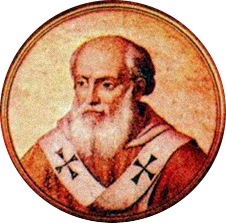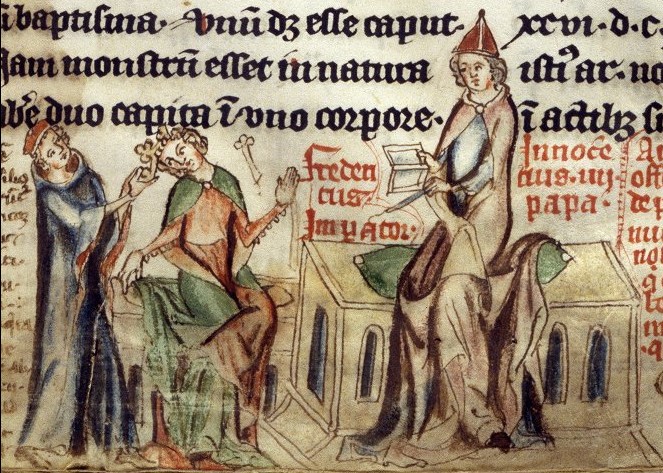|
Qui Iustis Causis
''Qui iustis causis'' is a papal bull issued by Pope Innocent IV on 23 September 1243 authorising crusades in Livonia and Prussia. Shortly after Innocent's election to the papacy, the Teutonic Order The Order of Brothers of the German House of Saint Mary in Jerusalem, commonly known as the Teutonic Order, is a Catholic religious institution founded as a military society in Acre, Kingdom of Jerusalem. It was formed to aid Christians on ... sought his consent for the suppression of the Prussian rebellion and for their struggle against the Lithuanians. It was reissued by Innocent and his successors in October 1243, March 1256, August 1256 and August 1257. When the bull was re-issued in March 1256, it was sent to Bishop Heidenreich of Chelmno and Bishop Henry of Courland, to support the Dominican's preaching for the Baltic crusade. Notes Sources * *{{cite book , title=Preaching the Crusades: Mendicant Friars and the Cross in the Thirteenth Century , first=Christoph T. , la ... [...More Info...] [...Related Items...] OR: [Wikipedia] [Google] [Baidu] |
Innocent IV
Pope Innocent IV ( la, Innocentius IV; – 7 December 1254), born Sinibaldo Fieschi, was head of the Catholic Church and ruler of the Papal States from 25 June 1243 to his death in 1254. Fieschi was born in Genoa and studied at the universities of Parma and Bologna. He was considered in his own day and by posterity as a fine canonist. On the strength of this reputation, he was called to the Roman Curia by Pope Honorius III. Pope Gregory IX made him a cardinal and appointed him governor of the March of Ancona in 1235. Fieschi was elected pope in 1243 and took the name Innocent IV. As pope, he inherited an ongoing dispute over lands seized by the Holy Roman Emperor, and the following year he traveled to France to escape imperial plots against him in Rome. He returned to Rome after the death in 1250 of the Emperor Frederick II. Early life Born in Genoa (although some sources say Manarola) in an unknown year, Sinibaldo was the son of Beatrice Grillo and Ugo Fieschi, Count of Lava ... [...More Info...] [...Related Items...] OR: [Wikipedia] [Google] [Baidu] |
Pope Innocent IV
Pope Innocent IV ( la, Innocentius IV; – 7 December 1254), born Sinibaldo Fieschi, was head of the Catholic Church and ruler of the Papal States from 25 June 1243 to his death in 1254. Fieschi was born in Genoa and studied at the universities of Parma and Bologna. He was considered in his own day and by posterity as a fine canonist. On the strength of this reputation, he was called to the Roman Curia by Pope Honorius III. Pope Gregory IX made him a cardinal and appointed him governor of the March of Ancona in 1235. Fieschi was elected pope in 1243 and took the name Innocent IV. As pope, he inherited an ongoing dispute over lands seized by the Holy Roman Emperor, and the following year he traveled to France to escape imperial plots against him in Rome. He returned to Rome after the death in 1250 of the Emperor Frederick II. Early life Born in Genoa (although some sources say Manarola) in an unknown year, Sinibaldo was the son of Beatrice Grillo and Ugo Fieschi, Count of Lavag ... [...More Info...] [...Related Items...] OR: [Wikipedia] [Google] [Baidu] |
Northern Crusades
The Northern Crusades or Baltic Crusades were Christianity and colonialism, Christian colonization and Christianization campaigns undertaken by Catholic Church, Catholic Christian Military order (society), military orders and kingdoms, primarily against the paganism, pagan Balts, Baltic, Baltic Finns, Finnic and West Slavs, West Slavic peoples around the southern and eastern shores of the Baltic Sea, and to a lesser extent also against Eastern Orthodox Church, Orthodox Christian Slavs (East Slavs). The most notable campaigns were the Livonian Crusade, Livonian and Prussian Crusade, Prussian crusades. Some of these wars were called crusades during the Middle Ages, but others, including most of the First Swedish Crusade, Swedish ones, were first dubbed crusades by 19th-century romantic nationalism, romantic nationalist historians. However, crusades against Estonians, but also against '''other pagans in those parts''' were authorized by Pope Alexander III in the bull ''Non parum ani ... [...More Info...] [...Related Items...] OR: [Wikipedia] [Google] [Baidu] |
Livonia
Livonia ( liv, Līvõmō, et, Liivimaa, fi, Liivinmaa, German and Scandinavian languages: ', archaic German: ''Liefland'', nl, Lijfland, Latvian and lt, Livonija, pl, Inflanty, archaic English: ''Livland'', ''Liwlandia''; russian: Лифляндия, Liflyandiya) is a historical region on the eastern shores of the Baltic Sea. It is named after the Livonians, who lived on the shores of present-day Latvia. By the end of the 13th century, the name was extended to most of present-day Estonia and Latvia, which had been conquered during the Livonian Crusade (1193–1290) by the Livonian Brothers of the Sword. Medieval Livonia, or Terra Mariana, reached its greatest extent after Saint George's Night Uprising that in 1346 forced Denmark to sell the Duchy of Estonia (northern Estonia conquered by Denmark in the 13th century) to the State of the Teutonic Order. Livonia, as understood after the retreat of Denmark in 1346, bordered on the Gulf of Finland in the north, Lake Peipu ... [...More Info...] [...Related Items...] OR: [Wikipedia] [Google] [Baidu] |
Prussia
Prussia, , Old Prussian: ''Prūsa'' or ''Prūsija'' was a German state on the southeast coast of the Baltic Sea. It formed the German Empire under Prussian rule when it united the German states in 1871. It was ''de facto'' dissolved by an emergency decree transferring powers of the Prussian government to German Chancellor Franz von Papen in 1932 and ''de jure'' by an Allied decree in 1947. For centuries, the House of Hohenzollern ruled Prussia, expanding its size with the Prussian Army. Prussia, with its capital at Königsberg and then, when it became the Kingdom of Prussia in 1701, Berlin, decisively shaped the history of Germany. In 1871, Prussian Minister-President Otto von Bismarck united most German principalities into the German Empire under his leadership, although this was considered to be a "Lesser Germany" because Austria and Switzerland were not included. In November 1918, the monarchies were abolished and the nobility lost its political power during the Ger ... [...More Info...] [...Related Items...] OR: [Wikipedia] [Google] [Baidu] |
Teutonic Order
The Order of Brothers of the German House of Saint Mary in Jerusalem, commonly known as the Teutonic Order, is a Catholic religious institution founded as a military society in Acre, Kingdom of Jerusalem. It was formed to aid Christians on their pilgrimages to the Holy Land and to establish hospitals. Its members have commonly been known as the Teutonic Knights, having a small voluntary and mercenary military membership, serving as a crusading military order for the protection of Christians in the Holy Land and the Baltics during the Middle Ages. Purely religious since 1810, the Teutonic Order still confers limited honorary knighthoods. The Bailiwick of Utrecht of the Teutonic Order, a Protestant chivalric order, is descended from the same medieval military order and also continues to award knighthoods and perform charitable work. Name The name of the Order of Brothers of the German House of Saint Mary in Jerusalem is in german: Orden der Brüder vom Deutschen Haus der He ... [...More Info...] [...Related Items...] OR: [Wikipedia] [Google] [Baidu] |
13th-century Papal Bulls
The 13th century was the century which lasted from January 1, 1201 ( MCCI) through December 31, 1300 ( MCCC) in accordance with the Julian calendar. The Mongol Empire was founded by Genghis Khan, which stretched from Eastern Asia to Eastern Europe. The conquests of Hulagu Khan and other Mongol invasions changed the course of the Muslim world, most notably the Siege of Baghdad (1258), the destruction of the House of Wisdom and the weakening of the Mamluks and Rums which, according to historians, caused the decline of the Islamic Golden Age. Other Muslim powers such as the Mali Empire and Delhi Sultanate conquered large parts of West Africa and the Indian subcontinent, while Buddhism witnessed a decline through the conquest led by Bakhtiyar Khilji. The Southern Song dynasty would begin the century as a prosperous kingdom but would eventually be invaded and annexed into the Yuan dynasty of the Mongols. The Kamakura Shogunate of Japan would be invaded by the Mongols. Goryeo resiste ... [...More Info...] [...Related Items...] OR: [Wikipedia] [Google] [Baidu] |
Documents Of Pope Innocent IV
A document is a written, drawn, presented, or memorialized representation of thought, often the manifestation of non-fictional, as well as fictional, content. The word originates from the Latin ''Documentum'', which denotes a "teaching" or "lesson": the verb ''doceō'' denotes "to teach". In the past, the word was usually used to denote written proof useful as evidence of a truth or fact. In the computer age, "document" usually denotes a primarily textual computer file, including its structure and format, e.g. fonts, colors, and images. Contemporarily, "document" is not defined by its transmission medium, e.g., paper, given the existence of electronic documents. "Documentation" is distinct because it has more denotations than "document". Documents are also distinguished from " realia", which are three-dimensional objects that would otherwise satisfy the definition of "document" because they memorialize or represent thought; documents are considered more as 2-dimensional repre ... [...More Info...] [...Related Items...] OR: [Wikipedia] [Google] [Baidu] |


.jpg)
.png)

